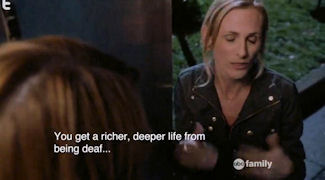
Features
Top Fives

Five Things You Need To Know Before You Become A Critic
Filed under: Top Fives
Have you ever thought of becoming a critic?
Do you have an opinion on a movie, television show, or in music that you want to share with the rest of the world? It turns out that most people, if not all people, have some kind of a critical opinion. Whether or not people want to expend the effort to write it down or to record it, is a different story. For those of you that have thought about doing it, this article is for you. Anybody can become a critic, but before you embark on this journey, here is a list of five things you should be aware of first. Specifically, this article is directed at people that have aspirations of writing for the internet under the direction of an editor.
#5 - Prove your commitment.
This is the absolute first thing you must do. This means having a body of work to present to an editor of a website that you would like to work for. This body of work will show that you have some ability in writing, enjoy writing, and more importantly, prove that you are likely to be committed to writing for your editor. Your editor is going to want somebody that will make regular contributions, as opposed to taking on a person that writes one or two articles and thinks that it is too much for them to do so they quit.
There are two things that will gain the favour of an editor. The first, is if you have written regular articles in a timely manner that you have already posted on the internet -- usually on a forum, or even on your social media account. This is helpful in that an editor can view your punctuality, regularity, and what you consider as a good enough article to put on the internet for people to read. The other thing that will help convince an editor of your worth, is if you have your own website. Having managed your own website shows your dedication and knowledge of websites, both of which are constructive qualities that every responsible webmaster possesses.
#4 - There is no money in it.
If there is one thing the internet has taught us, it is that it is just about impossible for the average person to make much money off the internet. This is even more true when it comes to being an internet media entertainment critic. Everybody has an opinion, and it is almost impossible to make a living off writing your opinion for people to read. In other words, write because it is what you like to do. Not because you have aspirations that an editor is going to pay you for your work, or that somehow you are going to get rich off pop-up ads or Google ads (and just to let you know, Google are good at tracking the banner click scam). If money is your primary reason for wanting to be a critic, then you will find out very quickly that you will no longer want to be a critic.
#3 - Quality vs Quantity.
There are two kinds of articles that you write. There are your quality articles and your quantity articles. The quality ones will take LOTS of time to complete. They tend to be lengthy and some even require you to do some research in the writing process. You will be proofing them over and over again, because you want the thing to be flawless. But that is okay, because time is on your side, and you will not be satisfied until that article is up to your standards.
And then there are your quantity articles. You do not deliberately make these articles to be lower in quality. It is just that you are on a deadline. Because of this, you end up writing for quantity as opposed to quality. This will be true, if you are doing weekly episodic recaps, or for something new that just came out (movie, concert, or music album), and your readers are expecting to get your opinion in a timely manner. The thing is, people are busy, including the critic. Writing takes time. When you have taken on a commitment to write regular articles, and you are feeling the crunch of the deadline, be prepared to write a piece of work that may favour punctuality over quality.
#2 - Your relationship with your editor.
To put it in a sentence, you and your editor need to know each other. Find out what your editor expects of you, and what lines you should not cross (as evidenced by this former contributor that got fired for making a wisecrack about our editor's two wives in this article). It is necessary to have constant communication with your editor, and it is even better if there is a way to be in contact with the other website contributors as well, so that the website functions as a well oiled machine. Running a website with multiple contributors is no easy task. Everybody needs to be on the same page, and be aware of what direction the website is heading into. In terms of website expectations set out by the editor, things like consistency in style with other writers matters. For example, here on our Little Web Page, all of us writers will do things like italicize quotes, and put names of titles inside quotation marks, as directed by our editor. This makes it easier on the readers, and adds an element of teamwork and professionalism to the website.
Find out what kind of tools your editor has at your disposal for putting up your articles. As well, what kind of deadlines do you have? Can you post something besides text, such as audio interviews, or embedded videos? Is your editor going to give you tickets to see a movie that you are going to review? Do you have access to your article's page hits? Is there a way for readers to leave comments for you? Can you and the editor meet each other in person? These are all questions you should have for your editor.
 |
A good way to tell if a website is worth writing for, is to find out what kind of relevant connections it has made with other entertainment media related companies. I got my answer back in 2005, way before I even started writing for this website. A local Winnipeg business had given a friend and myself a couple of free tickets (and t-shirts) for an advance screening of Serenity. |
When we walked into the movie theatre auditorium, I noticed that there were a couple of seats that were marked as being reserved. Upon closer observation, I read that there was a sign indicating that the seats were saved for Canada Movies. net, the name of Showbiz Monkeys from back then. My immediate reaction to seeing the reserved seats, was that a local business (the movie theatre) took the website seriously, and that somebody at this website had to go out of their way to build these relationships with other companies. Canada Movies was not just some fan-site, but also seen as an important contributor in the promotion of entertainment media as well. In exchange for the free tickets, this website returned the favour by putting up a review on Serenity.

#1 - Find your own voice.
Or in other words, try not to sound like every other critic there is out there. For some inane reason, critics like to all sound the same. They all love and hate the same things. Critics enjoy using film studies jargon and certain key words that are found in just about every review ever written. Critics like to flaunt their knowledge of cinema with their obscure references that are ultimately irrelevant to the reader, if for no other reason than to fit into the critic culture. Critics love to complain about movies being unoriginal, derivative and pretentious, but never notice that it is the critics themselves that are the ones that are the most guilty of these so-called crimes. This leads to most reviews coming off as being impenetrable and self-absorbed, as the majority of critics are afraid to write something that may deviate from the works of the self-proclaimed experts of the film industry. At the end of the day, you are just an opinion. That is all. You do not need to take yourself so seriously when you are a critic. The world does not cease to exist without you going into extensive detail of your near death experience at the hands of yet another formulaic and/or artsy cookie cutter movie not meeting your pointless elitist tastes.
Ask yourself why you are writing. If you are trying to fit into some kind of a critic culture, then you should probably not be a critic. Write because you appreciate a television show. Write because you like to make fun of bad movies. Write because your friends enjoy your opinion. Write because you just like to over analyze the hell out of something and to point out subtle stuff. Write because you like to put your words out on the internet. Write because it is therapeutic. Write because you like the way you write. Write what you want to write about. You decide this. Forget about sounding like everybody else. This is your own personal writing, and you are the one that chooses your style of writing, not other critics. You are bound to get people that disagree with you, and that is okay. You are just an opinion. But if you can get people to enjoy your article, then that is just a nice little bonus.
You know you have found your own voice when you have become your own biggest critic, since it is YOUR article. At this same time, you will also stop caring about how your writings stack up to the writings of other critics. You will have the sense of pride, that it is your writings that are posted on the internet for everybody to see. By this time, you should be able to describe what your own voice is. Here is how I describe my own voice, in the following examples of my work.
When I wrote about Breaking Bad, I focused on carefully looking at the incredible amounts of detail that went into the show, and in the downfall of Walter White. I only wrote two recaps for the first half of season five, as my writing duties were shared with another Showbiz Monkeys contributor. The sharing eased the writing responsibility, provided a different perspective for our readers, and sometimes it is just nice to enjoy the show without having to worry about writing about it. The main reason I wrote about Breaking Bad, was really because I am a big fan of the series. In addition, Breaking Bad was one of those shows that made you curious. I often wondered about what was happening off-screen. Admit it, if you were a fan of the show, you tried to figure out how Walter poisoned Brock. I often tried to imagine what was really happening with Gus, and how Walter would meet his end. I really believe that a good television show keeps you engaged in between episodes, by making you think and discuss it with other fans of the show. Posting Breaking Bad recaps was a way for me to put my thoughts together on the show, and to engage with fans of the Breaking Bad as well.
In response, I took it upon myself to push back against the one sided social commentary that Flashpoint preached. In my recaps, I had a habit of continuously ridiculing the series not just for its soft stance and inaccurate depiction on crime, but also on its poor research, predictable outcome, awful writing, and for its overly sentimental approach. Maybe it is just me, but I think that it is more important to be kinder to the victims of crime, than to the criminals themselves, as Flashpoint was really a slap in the face to anybody who had ever been on the receiving end of a crime. This is not to say that I hated watching the show. In fact, Flashpoint was one of those shows that were just so terrible, that it actually became entertaining to watch.
Flashpoint may not have ever been able to disappoint me by failing to meet my expectations, but The Office sure as hell did. The first two seasons of The Office were brilliant. It had a way of making viewers feel a deep sense of cringing emotions, as the harshness of the workplace unfolded in each episode. It was hilarious, as it captured the all too realistic pettiness of work, combined with the psychological self-beatings that can only come from personal shortcomings. Life hurts, and the show turned that pain into comedy. After the second season, The Office seemed to lose direction, which hurt the quality of its writing severely. As the years went by, the quality of The Office got so bad, that it became completely unwatchable.
It actually took me a surprisingly short amount of time to write that article on Switched At Birth. Maybe it is just easy to have an opinion, when I watch something moronic for over thirty episodes. When I was done writing the article, I took a long look at it, and really did not feel like posting the thing. How would it look if I had put up an article that dared to point out that the differently abled need to lie to themselves in order to cope with their disabilities? While I stalled, I decided to do a little internet research of my own, and could not find anything on the world wide web that even vaguely resembled my opinion on the whole disability stance that Switched At Birth exhibited. It was at that moment, that I realized that I should go ahead and post my article. Maybe there are people out there that agree with me, but for whatever reason, are unable to vocalize themselves even on the internet. So maybe I am writing to represent a specific audience after all -- one that is either incapable of expressing themselves, or one that does not know that an alternate opinion can even exist.
Herein lies the power of the internet. Being able to get a point of view out there that is accessible to anybody with an internet connection, is what having a voice is all about to me. It is what allows me to reach you. At the same time, my one voice adds to your options of what information you wish to obtain from the internet. To go back to the original point, if you still want to be an internet writer, you should understand why there is no big conclusive final paragraph to this article. This is because it is about your own beginnings, and your decision on whether or not to pursue becoming an internet writer or a critic. How the story continues or ends is up to you.
Tags: Five Things You Need To Know Before You Become A Critic, Serenity, Better Than The Original, Firefly, Bryan Cranston, The Big Bang Theory, The Office, Flashpoint, Breaking Bad, Switched At Birth
Related Posts
- Breaking Bad - Felina
- Breaking Bad - Granite State
- The Walter White Five Stages of Breaking Bad
- TV Rants & Raves: Switched At Birth
- Top Fives: The First Five Times The Office Jumped the Shark






SBM on Social Media